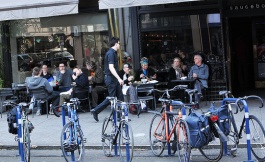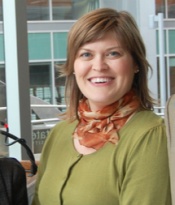
(Photo © J. Maus)
A research project at the Oregon Transportation Research and Education Consortium (OTREC, housed at Portland State University) is taking a closer look at how bike-riding customers and bike infrastructure (or lack thereof) impacts the business bottom line.
The principal investigator is Kelly Clifton, an associate professor at PSU. I sat down with Clifton last week to learn more.
“There are some businesses who think that cyclists are of lower incomes, that they spend less, that they’re not going to visit as much… ‘So why are we catering to them?’ they wonder.”
— Kelly Clifton, researcher
The impetus for this research came from the City of Portland and the Portland Development Commission (PDC). As PBOT pushes further out in the city, where bicycling is less common, Clifton says they want to be armed with information to quell fears that bikeway improvements are somehow bad for business.
“Where there bike network is less robust there’s some push back from businesses. They’re concerned about losing parking, and they’re concerned that the City is going to make it more difficult for cars to access their establishments… The study is to wed travel behavior with consumer behavior,” says Clifton.

(Photo: OTREC)
Armed with information gleaned from this research, the businesses might find that better bike access could even be good for business. But right now, many businesses think just the opposite.
“There are some businesses who think that cyclists are of lower incomes,” says Clifton, “that they spend less, that they’re not going to visit as much.. ‘So why are we catering to them?’ they wonder.”
Clifton’s project will look at the land use around several types of establishments to see how/if it correlates to the mode choice of customers. Her team will also survey customers about their travel patterns, spending habits, and vehicle choice. Managers of the businesses will also be interviewed to get their opinion of cycling customers and whether or not providing quality bike access is a priority.
Business types chosen for the customers surveys include coffee shops, “high turnover restaurants” like pizza and Mexican food, as well as Plaid Pantry convenience stores. Clifton had hoped to survey customers at Safeway and New Seasons, but both stores declined to take part (although New Seasons will supply researchers with their own in-house customer survey).
Going into the data-gathering phase of the study, Clifton says her “gut instinct” is that “cyclists spend just as much as anyone else.” “My null hypothesis is that there really won’t be any difference by mode at these types of establishments.”
The project has a budget of $250,000, which was paid for by the PDC, Bikes Belong, and Travel Oregon. Clifton hopes to have a final report completed by late fall of this year. Learn more about the study at OTREC.us.

